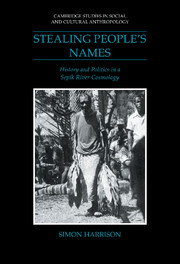Book contents
- Frontmatter
- Contents
- List of illustrations
- List of tables
- Acknowledgements
- Introduction
- 1 The Manambu
- 2 Avatip
- 3 Magic and the totemic cosmology
- 4 Ceremonial rank
- 5 Male initiation
- 6 Treading elder brothers underfoot
- 7 The debating system
- 8 The rise of the subclan Maliyaw
- 9 Symbolic economies in Melanesia
- Bibliography
- Index
- Cambridge Studies in Social and Cultural Anthropology
6 - Treading elder brothers underfoot
Published online by Cambridge University Press: 08 September 2009
- Frontmatter
- Contents
- List of illustrations
- List of tables
- Acknowledgements
- Introduction
- 1 The Manambu
- 2 Avatip
- 3 Magic and the totemic cosmology
- 4 Ceremonial rank
- 5 Male initiation
- 6 Treading elder brothers underfoot
- 7 The debating system
- 8 The rise of the subclan Maliyaw
- 9 Symbolic economies in Melanesia
- Bibliography
- Index
- Cambridge Studies in Social and Cultural Anthropology
Summary
Introduction
In a classic paper comparing the political systems of Melanesia and Polynesia, Sahlins (1963) identified Big Men – financial transactors and entrepreneurs – as the quintessentially Melanesian type of traditional leader. But more recently a number of authors have suggested that Melanesian patterns of leadership are rather more diverse than Sahlins' argument implies (Allen 1984; Chowning 1979; Douglas 1979; Godelier 1986). In particular, it has become evident that the control of knowledge is an important basis of leadership in some Melanesian societies, and that leaders in these societies differ from the Big Men described by Sahlins. Lindstrom, for instance, has suggested an ideal-typical distinction between ‘wealth-based’ and ‘knowledge-based’ Melanesian polities, arguing that in the latter
[w]here men achieve power by knowledge alone, control of its production, exchange and consumption is (rather than merely serves) political praxis.
(Lindstrom 1984: 305)Avatip approximates very closely to Lindstrom's ‘knowledge-based’ type of Melanesian polity, and in this chapter I discuss the significance of ritual knowledge as the key resource of leaders in Avatip society, and the ways in which processes of political competition revolve around the transmission and control of this knowledge. The first part of the chapter deals with the transmission of hereditary mythology and magic within the subclan, and the implicit – and sometimes explicit – competition between subclan-agnates for the control of this lore.
- Type
- Chapter
- Information
- Stealing People's NamesHistory and Politics in a Sepik River Cosmology, pp. 114 - 139Publisher: Cambridge University PressPrint publication year: 1990



